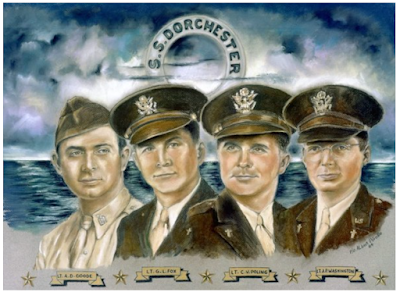It’s been 75 years since the U.S. Army Transport Dorchester was hit by German submarine U-223 while transporting 902 servicemen, merchant seamen and civilian workers to Greenland. On Feb. 3, 1943. four Army chaplains on board gave their lives to save others.
“It was the finest thing I have seen or hope to see this side of heaven,” recalled one survivor, quoted in an Army history.
The ship was hit below the water line with a torpedo, initially killing and wounding many men on board. Lt. George Fox, a Methodist; Lt. Alexander Goode, a Jewish Rabbi; Lt. Clark Poling, a Dutch Reformed minister; and Lt. John Washington, a Roman Catholic Priest, acted quickly to calm the men and distribute life jackets.
When they ran out of life jackets, the four chaplains removed their own and gave them away as well. As the ship sank, the chaplains could be seen, arms linked, on the deck, and heard, singing hymns and offering prayers.
Each man was determined to serve God and his country, according to the National Museum of the U.S. Army website. They were among the 672 men who died that day.
Fox, raised Catholic, fell away from his religion and embraced the Methodist church after serving in World War I, becoming a reverend and then state chaplain of Vermont before serving as an Army chaplain in World War II.
Goode applied first to the Navy, where he was rejected. But after Pearl Harbor, the Army accepted his chaplain application, and he asked repeatedly to be deployed overseas. He finally was, aboard the Dorchester.
Washington, who lost much of his eye sight in a BB gun accident as a child, was turned down by the Navy. He then went to the Army, where he covered his bad eye both times when reading the eye chart. They didn’t notice, and he was accepted.
Poling was the seventh generation of his family to become a minister, and he signed up to be an Army chaplain despite his father’s concerns. Poling asked his father to pray for him before boarding the Dorchester, according to information from the Army. “Not for my safe return, that wouldn’t be fair. Just pray that I shall do my duty ... never be a coward ... and have the strength, courage and understanding of men. Just pray that I shall be adequate.”
Each chaplain was posthumously awarded a Distinguished Service Cross and a Purple Heart in 1944, but many thought they deserved Medals of Honor. To work around the medal’s requirement of heroism under fire, Congress authorized a Special Medal for Heroism.
The Four Chaplains’ Medal was awarded to the chaplains’ descendants by Secretary of the Army Wilbur Brucker on Jan. 18, 1961. In 1948, Congress designated Feb. 3 as “Four Chaplains’ Day,” in honor of the four brave men whose loyalty to both their religions and their country shined bright that day in 1943. The Field of Four Chaplains at Fort Benning, Georgia, was named in their honor.
Article from the Military Times



No comments:
Post a Comment
Enter your Comments below. Keep it clean.